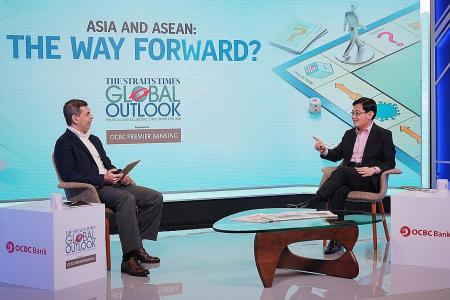Economy likely to pick up later this year: DPM Heng
Vaccination drives around the world give hope pandemic can be better controlled
The Singapore economy is likely to stage a slow recovery in the second half of this year, said Deputy Prime Minister Heng Swee Keat yesterday as he gave his outlook for 2021.
This is in line with the global consensus that the world's economy may recover in the second half of the year as a result of vaccination programmes that have kicked off, giving hope that the pandemic can be better controlled, he added.
"Even then, the world has lost a significant part of its gross domestic product, and even if that scenario pans out, it will still likely be below the 2019 level. So that is the scenario that we have to plan on," said Mr Heng at The Straits Times Global Outlook Forum.
He was responding to a question from the moderator, Straits Times editor Warren Fernandez, on his forecast for the economy this year amid the uncertainty that has roiled markets in the past year.
Mr Heng said the way to deal with uncertainty is to assess what is the most likely, or central, scenario for the economy, and then to look at the potential upsides which may give surprises and the possible downsides to prepare for.
"In the case of the Singapore economy... our central scenario is that we may see that the first half will still not be very good. The second half, we may begin to see some uptick in activities," he said at the annual conference organised by The Straits Times, in partnership with presenting sponsor OCBC Premier Banking, and held online.
Mr Heng, who is also Coordinating Minister for Economic Policies and Finance Minister, cited the vaccination drives going on around the world and the global consensus that the world economy may recover in the second half of this year.
A potential positive factor could be vaccination efforts turning out to be very effective across the world, allowing it to overcome the pandemic, he said.
Possible downsides include tensions between the United States and China escalating - which would have a "dampening effect" on the global economy - and vaccines not working as well as expected.
Mr Fernandez, who is also editor-in-chief of Singapore Press Holdings' English/Malay/Tamil Media Group, asked whether Mr Heng was more optimistic for the coming year.
On the economy, Mr Heng said: "My central scenario is that this year will be better than last year."
He pointed out how new variants of the virus have emerged and how new outbreaks have led to a resurgence of infections in places that had done well to control the virus initially.
"It is not something that we can wish away, so I would say we need to take a very realistic approach to this," he said.
Responding to a question on the five Budgets that had to be announced over the past year as the pandemic took its toll on businesses and people, Mr Heng noted that he addressed Parliament nine times over the past year. "My wish for this year is one Budget," he said.
FOR MORE, READ THE STRAITS TIMES
Working adults must continue to learn: DPM Heng
For many people, life can be divided into three simple stages: study, work, retire.
But this traditional mindset is due for a relook, said Deputy Prime Minister Heng Swee Keat yesterday.
Working adults must continue to learn while both seniors and young people now have many new challenges to engage in, he said.
"How can we enable our young people to learn even better; enable our working adults to learn?" Mr Heng said at The Straits Times Global Outlook Forum. "And how do you continue to stay mentally and physically healthy and socially active as you age?"
He had been asked for his take on the challenges Singapore will face this year, and if the country will be in for another hard slog.
"I think this year will be better than last year, mainly because with the vaccinations, there is some hope of bringing the pandemic under some control," Mr Heng responded.
When asked what positives came out of Singapore's experience with tackling the Covid-19 pandemic, Mr Heng, who is also Finance Minister, pointed to the Emerging Stronger Taskforce set up to study economic changes accelerated by the coronavirus.
The task force adopted a "very different approach" by establishing Alliances for Action, which brought together industry leaders, union representatives and government agencies on topics such as sustainability and digitalisation.
In the longer term, Singapore will need to grapple with two key challenges, Mr Heng said.
Its rapidly ageing population means that it will have to look at how it can continue to take good care of seniors. The country must also focus on how to help younger Singaporeans access opportunities.
This means that part of Singapore's research agenda will go beyond human health to focus on human potential, Mr Heng said.
"So am I more optimistic?" he added. "I'll say that well, we just need to have a sort of fairly robust attitude and hope for the best, but be prepared for the worst."
Get The New Paper on your phone with the free TNP app. Download from the Apple App Store or Google Play Store now


